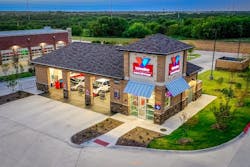The quick lube industry has seen big changes in the past several years. Technicians and owners are meeting new expectations from consumers while facing issues like employee shortages and supply chain disruptions. These pandemic-related concerns, along with new technologies and changing industry trends, have left many business owners with questions about the future of their operation.
Owners with an eye toward selling their business should be mindful of buyers who value the business based on pandemic-impacted financial statements and point of sale (POS) data. Many businesses that remained open during the height of the pandemic likely experienced a significant drop in business, and the impact of the pandemic should be excluded when valuing the business. Once these adjustments are made, actual oil changes, ticket, expenses, and resulting cash generated by your quick lube will remain the primary factors for valuation. The operation’s future potential will also influence the value of your business to the buyer, which could include factors such as nearby retail activity, demographic data, and economic growth trends.
If you’ve decided to sell: You’ll need some documents to track past performance. These documents generally include the last three years’ POS data and a breakdown of oil changes versus other services, products or repairs sold on site. As previously mentioned, past performance will be used as the starting point to value your business. Most investors simply want a clear picture of how your overall business looks, performs, and trends under normal operating conditions, and a solid buyer can help you get there by partnering with you throughout the entire process.
Here’s a checklist of what a buyer may need from you:
- A signed non-disclosure agreement (NDA) to protect both parties’ sensitive information
- 3 years’ POS that includes:
- Oil changes performed
- Repair services sold on site
- Products sold on site
- Three years’ P&L financial statements that include:
- Product cost and labor
- Operating expenses
- Occupancy expense
- A list of non-business-related expenses (e.g. family mobile phones, health insurance, and vehicles)
If you have a lease: In this situation, make sure to partner with a buyer that is willing to work with your landlord to assume the lease, and prepare to provide the lease terms and other financial responsibilities.
If you own the property: In this situation, the buyer may provide the option to buy or lease your property. A long-term lease may allow you to postpone some taxes, avoid the time and expense of managing the property, and still provide the flexibility of selling the real estate in the future when the timing is right. Whether selling or leasing, ensure you’re working with a financial advisor to understand all the potential tax impacts.
What is my business worth? The next step is calculating EBITDA: Earnings Before Interest, Taxes, Depreciation and Amortization, or in other words cash flow. The buyer wants to know the cash you are generating today, and the cash they could generate if they owned your business tomorrow.
You’ve done the legwork, now what? Once the buyer works with you to calculate EBITDA, and both parties remain interested, you’ll move into the next stage which includes a Letter of Intent (LOI). After the LOI is signed, the next steps will include assessments in the form of surveys, environmental testing, and market research.
Family and Employees: Employees and family often go hand-in-hand. If you are ready to sell, be sure to discuss with your buyer the options for compensation and benefits for current employees. Many acquiring companies can provide advancement opportunities for those already with the business due to the sheer size of their operations, area management and geographic coverage. They may able be able to offer robust health insurance, employer contributions to 401K, paid time off, training opportunities and other benefits.
If your family has worked with you to make your store a success, there may also be employment opportunities with the company who is purchasing your business. Alternatively, family members may not have an interest in a long-term role in the business, but their business dreams could benefit from the funding made possible through the sale of your store.
And how will you spend your time once the ink is dry and your people are taken care of? Take time to do what you have always wanted to do: spend more time with loved ones, travel, or enjoy other hobbies! You’ve earned it!
To learn more about transitioning into the next stage of your business, click here.
Not Ready to Sell? Make More Money Today to Increase Your Business Worth Tomorrow
If you are not ready to sell, but you need to grow, there are ways to increase your oil changes by two cars per day over four years, guaranteed. This is a smart way to increase the value of your business in case you decide you want to sell down the road. Put more cash in your wallet now and in the future! To learn more, click here or call: 1.859.357.7303.
You’ve got questions, Valvoline can help!
